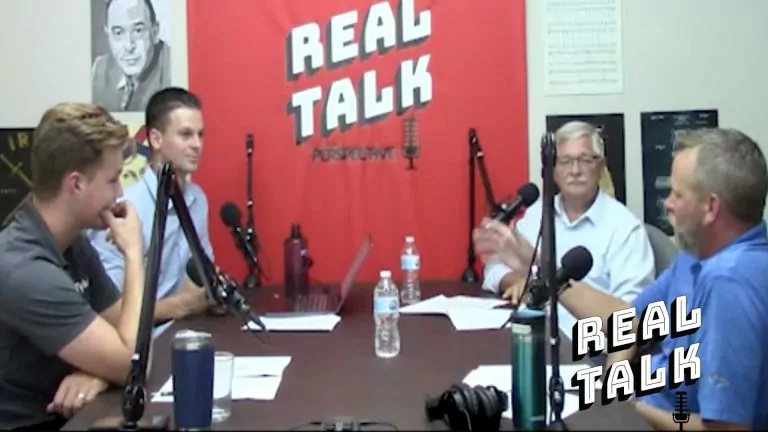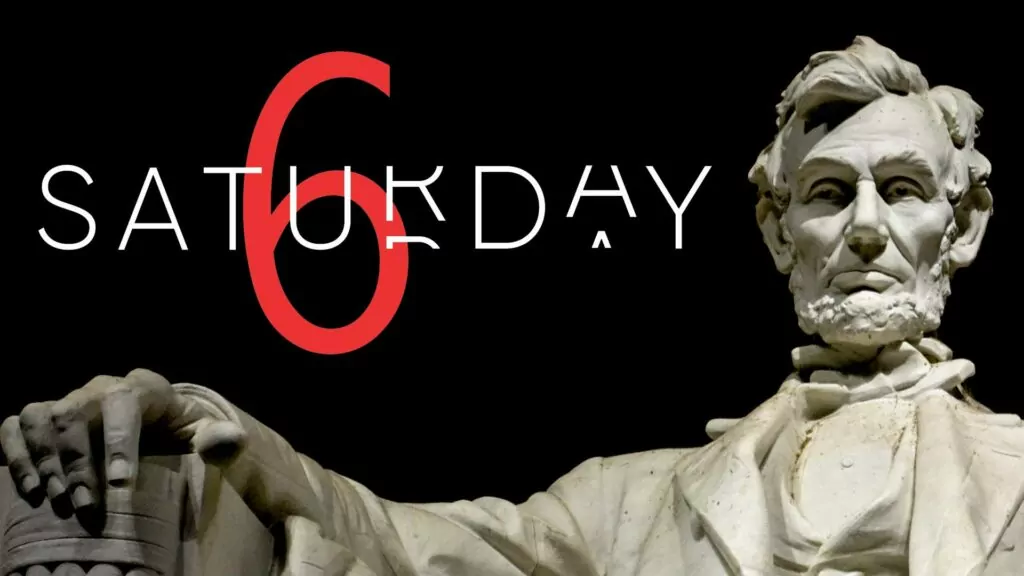This is an overview of an episode of Lucas Holtvlüwer and Tyler Vanderwoude’s Real Talk, a biweekly podcast under the Reformed Perspective umbrella. It features great guests talking about a host of issues affecting our Reformed community, ranging from social and economic, to theological and educational. If you haven’t checked it out already, you should. And you can, at www.RealTalkPodcast.ca.
****
The Oct. 10 episode of Real Talk was all about church unity. Hosts Lucas and Tyler were talking with a couple of pastors representing two denominations working towards being just one. Their guests were Rev. Steve Swets, pastor of the Rehoboth United Reformed Church (URC) in Hamilton, and Rev. Dick Wynia of Lincoln Canadian Reformed Church (CanRC). The conversation covered the history of both the CanRC and URC, as well as the current and potential future status of the two federations’ relationship.
Two pastors, three denominations
Both pastors were uniquely suited to the conversation. Rev. Wynia grew up as a member of a Christian Reformed Church (CRC) in St. Catharines, but studied at the Canadian Reformed Theological College in Hamilton, prior to being ordained in Aylmer CRC in 1987. He then helped to lead a Calgary congregation out of the CRC federation and (eventually) into the newly formed URC federation. And for the past fourteen years, Rev. Wynia has served at Vineyard CanRC in Lincoln. With his experience serving churches in three different federations, he brought a unique perspective to the conversation.
Rev. Swets calls himself “an American serving in Canada”: he was a minister at Abbotsford (BC) URC for over seven years, prior to taking the call to Rehoboth URC. Rev. Swets grew up in the south Chicago area, and as a teenager, was part of a church split out of the CRC that resulted in the formation of a new URC. Rev. Swets is the secretary of the United Reformed Churches’ Committee for Ecumenical Relations and Church Unity, and has preached in many Canadian Reformed churches over the years too.
A little history to start
To begin, Rev. Wynia gave a general outline of the history of how and why the Canadian Reformed Churches were founded, with a helpful explanation of the main reasons that many immigrants from the Netherlands who were members of the “liberated” churches, could not find themselves at home long term in the CRC congregations, nor in the Protestant Reformed Churches they found in Canada.
(The CRC had not taken much interest in the church split that had happened in the Netherlands in 1944, with “liberated” churches on the one side, and the GKN church federation they’d been driven out of on the other. But by not taking a side, the CRC effectively supported the GKN. In addition, church leaders in the CRC did not want to bring any of the controversy from the Netherlands into churches in North America, and did not want immigrants to speak about these issues. But such a restriction couldn’t be acceptable to “liberated” believers – they couldn’t be somewhere where they weren’t allowed to talk about the stand they’d thought so important they’d taken it at the cost of friendships and family relationships too..)
Prof. K. Schilder, one of the leaders of the “liberation” had warm regard for the Protestant Reformed Churches (PR), so some of the “liberated” immigrants formed PR churches in Hamilton and Chatham, Ontario shortly after arriving in Canada. However, the PR Synod of 1950 required that their churches subscribe to a specific view of the covenant. This restriction on covenantal views was the very reason the “liberated” members had left the GKN, and so they could not live with a condition like this after their significant struggles in the Netherlands.
After this CanRC history lesson, Rev. Swets summarized how the United Reformed Churches came to be founded. They were begun largely by former members of the CRC who disagreed with that denomination’s views and decisions on the authority of the Bible:
“It really came to a head around 1995, when the CRC opened all the church offices to women… and there were issues of theistic evolution, and practicing homosexuals in good standing in the church. There were a lot of peripheral issues but really what it came down to is the Scripture.”
As Rev. Swets explained, by making the Scriptures and Biblical teaching limited to the culture or time of Paul or Moses (as the CRC was doing),
“you start to undermine the authority of the Scriptures: The Bible does not actually say what it means… all of a sudden you’ve kind of knocked the foundation out of the authority of Scripture. I’d say that is the real reason why these churches left the CRC.”
Rev. Wynia also recalled the controversies regarding the teaching of Calvin College professors like Harold Dekker, who denied limited atonement, and Howard VanTil, who held to theistic evolution. They held views that were not Biblical but which were being tolerated.
Why didn’t CRC exiles join the CanRC in the 90s?
Holtvlüwer asked if those who left CRCs in Canada during this period considered joining with the Canadian Reformed Churches.
Rev. Swets answered that although he wasn’t involved personally at that time, his understanding was that
“the URC needed to be established, and we needed to figure out who we were…. Dr. DeJong, and Dr. VanDam’s advice (to us) was to get ourselves established first, and then we’ll meet… and we can figure out a way forward of how we can become one that makes sense… So the advice was to become your own federation first.”
Rev. Wynia recalled asking Dr. Jelle Faber, his former professor from the CanRC seminary, for advice:
“I remember as a pastor in Calgary saying, ‘What do I advise my congregation to do; you know, there’s a true church in Calgary: should we start a new church, or should I say to (our members) that we are obliged to go there?’ And (Faber) said, ‘You have to be the shepherd of your sheep; if you advise them (to join the CanRC in Calgary), they will scatter, and this way [starting an independent congregation] you hold them together.’”
Some of the history of personal relationships and acquaintances was also a factor in the new federation forming. Rev. Wynia remembered that “at that time, you would have had members who remembered the Liberation (in the Netherlands), and… that was a bitter thing… I mean, they had their conflicts in the Netherlands, and to some degree in Canada, and they remembered.”
The group also discussed the impression that especially twenty-five years ago, some CanRC members would have considered their federation the only true church. While this was never an official position of the federation, enough CanRC members may have defended that idea to make former CRC members hesitant about getting together. Rev. Wynia brought up the counterpoint that whenever this issue was raised at the level of consistories talking to one another, the issue was quickly dealt with. As one CanRC consistory put it to Rev. Wynia, “If we didn’t think you were true churches, we wouldn’t be talking to one another.”
“There’s a lot of personal issues (in the past), and the pastors and leadership knew this,” said Rev. Swets. Some of these issues, dating back to the 1950s were still, in 1995, remembered by older church-goers. But not any more, 25 years later. As all four gentlemen could agree, there is excellent cooperation today between churches from the two federations.
Three obstacles to unifying
In 2001, the two federations accepted one another as “sister churches,” and there were some fairly aggressive timelines proposed for an official joining together. These discussions stalled for a variety of reasons (including a lack of enthusiasm from many of the URCs in the United States). The three main obstacles seemed to be:
- a Proposed Joint Church Order which neither federation could entirely accept,
- the issue of federational or independent theological seminaries for the training of ministers,
- and a non-theological issue that still is close to members’ hearts – what songbook could be used in the worship services.
This last issue highlights a difference in the decision-making process within each federation. The URCs overall prefer that a matter like which songs may be sung in worship services would remain within the purview of the local elders.
While agreeing that Christ’s authority rests with local elders in local churches, the CanRCs have traditionally decided many things together at their General Synods. Rev. Swets stated, “There is a perception from the URC that the Canadian Reformed (church order) is too hierarchical, and that Synod has too much authority; Synod says too much.” With the URC’s history, coming out of the CRC denomination where the problems started at the top, this is a particularly understandable concern.
We have grown closer
The first half of the podcast might have had listeners believing that there is no foreseeable path towards unity for these two church federations. However, much of the second half of the podcast highlighted the progress that has been made over time. In Canada especially, there’s all sorts of cooperation between churches: in education, in mission work like Streetlight Ministries in Hamilton, and in recognition of one another.
In 2016, the URC took a six-year hiatus from further unity talks with the CanRC. But this year, in the URC Synod Niagara 2022, unity efforts will resume. The Synod will hear reports from the URC Committee for Ecumenical Relations and Church Unity, including the results of a survey that the committee put out to each URC. (This podcast was recorded about a month before Synod Niagara took place.) The results of this survey suggest that a small majority of the 58 URCs that responded are in favor of federational unity with the CanRC.
As might have been expected, a higher percentage of the Canadian URCs are in favor, while less than half of the American URCs responded positively. Only eight of the churches surveyed indicated they had any “theological concerns” regarding a potential union. One of the theological concerns brought up is the fact that the CanRCs have not made a federational statement on the Federal Vision movement, although professors from the Canadian Reformed Theological Seminary have participated in meetings and forums to explain the CanRC view of the covenant, and of the Federal Vision.
Looking further at the survey, Rev. Swets pointed out that “Twenty-eight of the 58 churches said they perceive the Canadian Reformed to have a hierarchy.” He personally disagreed with this perception, and stated that the URCs could also be perceived as having structures that are hierarchical. “We actually have a Stated Clerk of the URC; we elect him every Synod… he’s an employee of the URC.”
Rev. Wynia reminded the group that both federations “have some diversity of views when it comes right down to it… Professor Schilder, before the Liberation in Holland, would say that he could live in the same church federation as Kuyper, (despite their) different views of the covenant. We can tolerate theological divergencies. There’s an acceptable range that we would judge as within the bounds of the confessions and live with those differences.”
Rev. Swets shared one possible route to unity, by the CanRCs accepting the URC church order:
“Since the URC church order is broader than the Canadian Reformed, the Canadian Reformed church order can fit within the URC church order… The way that would work is that you would have to introduce regional synods into the URCs, or have the seminary under the oversight of, for example, Regional Synod Canada, and therefore it still has church jurisdiction, still has professors appointed by and overseen by a church ecclesiastical body. That would be the fastest way forward that… If you did that, nothing would have to change in the life of a Canadian Reformed Church: you aren’t forced to have the Trinity Psalter Hymnal if you don’t want, it’s up to each church. You can keep the Book of Praise… Whereas if the URCs become Canadian Reformed, we’d have to throw away our Trinity Psalter Hymnal for corporate worship, and we’d have to sing out of the Book of Praise… There would have to be more changes for the URCs to become Canadian Reformed, whereas in practice there wouldn’t be changes for the Canadian Reformed to become URC. The things you’d have to change are behind the scenes, like the oversight of the seminary, and how does superannuation work for ministers, but in the life (of the average member) nothing would have to particularly change.”
In his concluding remarks, Rev. Swets said, “When you talk about church unity, there’s a lot of issues to deal with. But at the very foundation of all unity is that it has to be given by the Holy Spirit. It can be frustrating because it takes time; you have to be patient in it, and pray, pray the Holy Spirit will work in this way…” Rev. Wynia expressed thankfulness for the unity that the two federations do have already, and for the progress made so far, in these discussions together.
Readers who would like to listen to more are encouraged to download the 90-minute podcast at www.RealTalkPodcast.ca, or watch the video version below.














